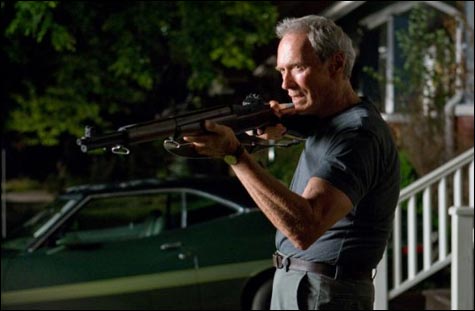
TAKING AIM: Clint in Gran Torino
|
In Mystic River, Clint Eastwood examined the damage to a close-knit group of Boston friends, years after one of them was sexually abused by a stranger, in a film depicting the power of sexual abuse with Catholic overtones. Eastwood also directed and starred in Million Dollar Baby, about a Roman Catholic boxing gym owner struggling with his faith, and, eventually, with its prohibition on euthanasia.
In his latest hit, Gran Torino, Eastwood once more plays a tough guy struggling with his Catholicism. This time he's bigoted Korean War hero Walt Kowalski, who rebuffs his young pastor's spiritual guidance until cancer and certain death push him into the confessional.
Eastwood-related bios all over the Web consistently describe him as "raised as a Protestant," and now claiming to be an agnostic. No Catholic conversion, nor consideration of a conversion anywhere.
So why the consistent Catholic reference in Eastwood's films that he produced, directed, and had at least a bit of involvement in the screenplays?
Surely, what Catholics call the "smells and bells" of church rituals make great movies. The average Mass has more intoxicating incense, inspiring music, enchanting bells, hypnotic candles, and elaborate costumes than many Broadway musicals.
Put all of that inside an imposing gothic church, with dozens of rows of carved pews, marble floors, gilded ceilings, sculptures, oil paintings, and stained glass windows, and the austere Protestant church doesn't have a prayer.
More likely, however, an artist like Eastwood, dealing with the artistic and practical constraints of a two-hour film, understands that the Catholic context speaks volumes to the audience. In Gran Torino, Eastwood's brief confessional scene clarifies more than could 10 pages of dialogue or five minutes of narration, and it does so in a moving and interesting way.
What does he confess?
That he once kissed another woman at his Ford plant Christmas party while his wife, who later died, was in another room, and that he once made $600 on a motorboat and never paid taxes on it.
"Just like stealing" he explains to the young priest.
The viewer, who suspects throughout the film that Kowalski really is a good man despite his 1950s' outlook and wrinkles, gains affirmation through the brief confession scene. After that short scene, the audience knows much more about the film's protagonist and who he is about to become in the finale.
For Eastwood and many other great directors (Coppola in the Godfather trilogy, for example) the Catholic backdrop becomes a shorthand explanation for what makes the character tick. It does this succinctly, in a context familiar to moviegoers — Catholic or not.
Eastwood's characters' lifelong anguish about these "venial sins" disappears with a few Hail Marys and Our Fathers. In Million Dollar Baby, even the final illegal mercy killing becomes acceptable because the hero has such deep faith.
In real life, as many Catholics (and "fallen") know, fitting Vatican teachings into our daily decisions isn't always so easy; but we live in the hope that some day life can imitate art.